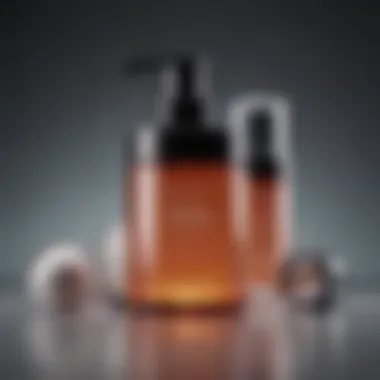Comprehensive Solutions for Dry Scalp Relief


Intro
Dry scalp is a common condition that many experience, yet it often goes unnoticed or misunderstood. It occurs when the scalp lacks moisture, leading to flakiness, irritation, and discomfort. Several factors contribute to the development of dry scalp; these can range from environmental influences like harsh weather and indoor heating to personal habits such as infrequent washing or using inappropriate hair products. Additionally, underlying medical conditions, including eczema or psoriasis, may exacerbate the situation.
Understanding the intricacies behind dry scalp is crucial for effective treatment and prevention. This article explores a variety of solutions available, detailing their effectiveness and guiding readers through the complexities of maintaining a healthy scalp. The aim is to provide actionable insights that empower individuals to tackle dry scalp effectively, fostering overall scalp health and comfort.
Understanding Dry Scalp
Dry scalp is a common yet often overlooked issue that affects women of all ages. Understanding this condition is essential, not just for individuals dealing with it but also for a broader awareness of scalp health. A dry scalp can lead to discomfort, persistent itching, and even flaking, resembling dandruff. Knowing the causes, symptoms, and available solutions can make a significant difference in managing and preventing this condition.
By exploring the factors that contribute to dry scalp, readers gain insight into effective care practices. Addressing dry scalp is not only about temporary relief; it involves adopting sustainable habits to promote long-term scalp health. This article will offer actionable solutions and tips, empowering readers to take control of their scalp health.
Defining Dry Scalp
Dry scalp refers to a condition where the skin on the scalp becomes dehydrated, leading to irritation and potential skin breakdown. It can be caused by various factors including environmental conditions, personal care habits, and underlying health issues. A dry scalp may not only be uncomfortable but can also signify issues that, if unresolved, may contribute to more significant skin or hair problems.
Understanding dry scalp encompasses recognizing it as a condition rather than just a simple annoyance. This allows for more informed choices regarding treatments and daily care routines.
Common Symptoms
The symptoms of dry scalp vary from person to person but commonly include:
- Itching: This is often the first noticeable sign of dry scalp. The itching can become quite intense, prompting frequent scratching, which can exacerbate the problem.
- Flaking: Small, dry flakes may be visible on the scalp and hair, often mistaken for dandruff. Unlike dandruff, which is often oily, flakes from dry scalp are drier and might accumulate or fall off more easily.
- Tightness: Many individuals report a feeling of tightness or discomfort on their scalp, especially after washing.
- Redness or Irritation: Some may experience redness or irritation, which can indicate inflammation.
- Dry Hair: The hair itself may appear dull and lifeless due to the lack of moisture reaching the hair follicles from the scalp.
"Acknowledging the symptoms of dry scalp is the first step toward effective treatment. Taking note of these signs provides crucial information on the underlying causes that need to be addressed."
Recognizing these symptoms early can lead to better management and treatment options. By understanding the significance of dry scalp and its symptoms, individuals can take proactive steps toward achieving optimal scalp health.
Causes of Dry Scalp
Understanding the causes of dry scalp is vital for developing effective treatment strategies. Identifying the underlying elements that contribute to this condition can lead to more targeted solutions. This section explores various factors, including environmental influences, personal care habits, and medical conditions, that can exacerbate dryness.
Environmental Factors
Climate Influence
Climate plays a significant role in the moisture levels of the scalp. Cold, dry weather can strip the skin of its natural oils, leading to a dry and flaky scalp. Humidity levels are also important; high humidity may improve scalp conditions temporarily while low humidity worsens it. This section highlights how the environment directly affects scalp health and reinforces the need for tailored care according to the season. Strategies may need adjustment based on climate changes.
Pollution Impact
Air pollution is another environmental factor impacting scalp health. Pollutants can irritate the scalp and cause inflammation, leading to dryness and discomfort. This means that those living in urban areas, where pollution is more prevalent, may experience worse dry scalp issues. Addressing pollution with effective cleansing regimens can be crucial for maintaining scalp balance. Those who focus on cleaner environments might benefit from reduced symptoms.
Indoor Heating
During colder months, indoor heating systems contribute significantly to dry air, impacting scalp health. The lack of moisture in heated indoor environments can exacerbate existing dry skin conditions. It is essential to balance indoor humidity levels using humidifiers. This simple adjustment can make a noticeable difference in scalp comfort during winter months, preventing additional dryness and irritation.
Personal Care Habits
Over-Washing
Over-washing hair removes essential oils that help keep the scalp hydrated. Frequent shampooing may clean away dirt, but it also strips away moisture, leading to a dry scalp. A careful approach to washing—limiting frequency and using gentler products—can assist in maintaining scalp health. Those who experience symptoms of dryness might need to evaluate their washing routine.
Use of Harsh Products
Many hair products contain strong ingredients that can worsen dry scalp issues. Sulfates, alcohol, and synthetic fragrances can strip natural oils from hair and scalp. Choosing products with milder, more hydrating ingredients is critical to preventing irritation. Those who switch to gentler formulations may notice improved scalp comfort over time.
Heat Styling
Using heat styling tools can damage the hair and scalp. Excessive heat can lead to dryness and brittleness, affecting scalp hydration. To minimize this impact, reducing heat styling frequency and applying heat protectants is advisable. This adjustment not only protects hair but also helps retain scalp moisture.
Medical Conditions
Psoriasis
Psoriasis is a chronic autoimmune condition that affects skin health, including the scalp. It can lead to severe dryness and flaking, which complicates scalp care efforts. Recognizing psoriasis as a potential underlying factor for dry scalp is crucial. Appropriate dermatological treatment can significantly improve scalp health for those affected.


Eczema
Eczema can also manifest on the scalp. This condition creates red, itchy patches that can lead to secondary dryness. Managing eczema requires a holistic approach, focusing on skin hydration and avoiding irritating substances. The connection between eczema and dry scalp cannot be overlooked; proper treatment is necessary to alleviate symptoms and promote healing.
Fungal Infections
Fungal infections, like seborrheic dermatitis, can contribute to flaky, dry patches on the scalp. These infections require medical management for relief. Identifying fungal infections early is important to prevent worsening symptoms. Treatments often include medicated shampoos that can help restore scalp health.
Overall, understanding these causes can illuminate the path to a better scalp care routine. This knowledge helps in selecting appropriate treatments and adjusting personal habits for optimal scalp health.
Effective Solutions for Dry Scalp
A comprehensive understanding of effective solutions for dry scalp is essential for those seeking relief and optimal scalp health. This section covers various products and treatments designed to address dry scalp, emphasizing the need for tailored approaches. By incorporating the right methods, individuals can enhance their scalp comfort and overall well-being.
Shampoos and Conditioners
Hydrating Formulas
Hydrating shampoos and conditioners play a critical role in alleviating dry scalp. These products contain ingredients that replenish moisture and restore balance to the scalp. A key characteristic of hydrating formulas is their ability to deeply nourish the scalp without stripping it of natural oils. This makes them a beneficial choice for those facing dryness. Many hydrating products feature ingredients such as glycerin and hyaluronic acid, both known for their moisture-retaining properties.
However, users should be cautious. Just because a shampoo is labeled as hydrating does not mean it will work for everyone. Individual scalp reactions may vary, so it is wise to perform a patch test when using new products.
Anti-Dandruff Options
Anti-dandruff shampoos specifically target a common symptom associated with dry scalp. These shampoos often contain active ingredients like zinc pyrithione or ketoconazole, addressing fungal growth that can lead to flaking and irritation. The key aspect of these products is their dual-action effect—they treat existing dandruff while preventing future outbreaks. Their popularity stems from effectiveness in providing relief to many users.
However, it is essential to understand that while they may be effective for some, they are not one-size-fits-all solutions. Some users may experience heightened scalp sensitivity or adverse reactions to active ingredients. Therefore, careful selection is crucial.
Natural Ingredients
Shampoos and conditioners with natural ingredients offer another layer of support for dry scalp care. Ingredients like argan oil, tea tree oil, and aloe vera are valued for their soothing and hydrating properties. The distinguishing feature of these products lies in their gentleness and lower likelihood of causing irritation. They provide a safer alternative for individuals who may react poorly to synthetic components.
Nonetheless, natural does not always mean better. Effectiveness can vary greatly from person to person, and some may find little relief from natural products. Therefore, selecting one based on individual needs and sensitivities is advisable.
Scalp Treatments
Oils and Serums
Oils and serums serve as targeted treatments to promote scalp health. They often contain rich oils like jojoba or tea tree, which not only hydrate but also nourish the scalp deeply. One key characteristic of oils and serums is their ability to penetrate the scalp barrier and deliver essential nutrients directly. Many users appreciate their ease of use, as these can often be applied directly and left in without rinsing.
Nonetheless, users should be aware of the potential for greasiness. Some formulations can lead to a heavy residue if applied in excess, so moderation is essential.
Scalp Exfoliants
Exfoliating the scalp is another method to address dryness effectively. Scalp exfoliants work by removing dead skin cells and excess buildup from hair products. Their key characteristic is the physical or chemical means of exfoliation. For example, some may contain salicylic acid, while others might use granules for scrubbing. Exfoliation can help improve scalp health and product absorption, making it a popular method.
However, over-exfoliation can be detrimental. Individuals should limit such treatments to avoid irritation or further dryness, which could negate potential benefits.
Leave-In Treatments
Leave-in treatments provide continuous hydration and protection for dry scalps. These are designed to be applied and left in, ensuring prolonged moisture retention throughout the day. A notable feature of leave-in treatments is their versatility, with a range of options available, from sprays to creams. This makes it easier to implement them into a daily routine.
Yet, users should consider their hair type. Applying a leave-in treatment that is too heavy for fine hair may lead to unnecessary weight or buildup.
Home Remedies
Coconut Oil
Coconut oil is frequently hailed as an effective home remedy for dry scalp care. The oil is rich in fatty acids and vitamin E, both known to moisturize the scalp effectively. This oil is a popular choice due to its skin-penetrating properties, which help soften the dryness and provide a soothing effect. Regular application can potentially lead to significant improvements in scalp health.
However, some people might find coconut oil too heavy, especially if left on for extended periods. A patch test before use can be a wise choice.
Aloe Vera
Aloe vera is recognized for its calming and hydrating attributes. Its key characteristic is the ability to soothe irritated skin, making it an ideal ingredient for dry scalp treatment. Aloe vera can be directly applied and usually does not cause adverse reactions. This makes it a beneficial option for various individuals.
That said, the effectiveness of aloe vera can vary, with some finding limited results. It's crucial to combine it with other effective treatments for optimal outcomes.


Apple Cider Vinegar
Apple cider vinegar is a popular home remedy that can restore scalp pH and balance. Its acetic acid content aids in preventing dryness and removing buildup from products. This characteristic gives it an edge in many DIY scalp care routines. Users often report a refreshing feel following application, making it a favorite among natural remedies.
However, due to its potency, dilution is necessary. Using apple cider vinegar undiluted can lead to irritation, which should be avoided.
In summary, selecting the appropriate solutions for dry scalp is essential. With various options available, individuals must consider their unique needs and reactions to different products and treatments.
Lifestyle Adjustments
Making appropriate lifestyle adjustments plays a significant role in the management of dry scalp. These changes often involve simple yet effective strategies that enhance scalp health and potentially prevent dryness. Proper lifestyle adjustments promote overall physical well-being, which in turn supports the health of the scalp and hair.
Dietary Considerations
Hydration Importance
Hydration is crucial for maintaining overall skin health, including the scalp. Adequate liquid intake supports moisture levels within the skin layers, reducing the likelihood of dryness. Drinking enough water daily helps keep skin cells hydrated and the metabolism functioning efficiently. This is essential because dry skin can lead to itchy, flaky scalp conditions, impacting one’s comfort and appearance. Moreover, while water is often considered the primary source of hydration, incorporating water-rich foods like cucumbers and melons can also provide necessary moisture, especially for those who struggle with drinking enough fluids regularly.
Essential Fatty Acids
Essential fatty acids are important for skin health. They help to restore the skin barrier function, preventing trans-epidermal water loss that can lead to dryness. Omega-3 and Omega-6 fatty acids, found in fish like salmon, walnuts, and flaxseed, are particularly helpful. They contribute to scalp hydration and improve the condition of hair. Including these in a diet supports not only scalp health but can also enhance hair shine and elasticity. However, it is essential to balance fatty acid intake, as excessive consumption might lead to unwanted weight gain.
Vitamins and Minerals
Vitamins and minerals play a critical role in scalp and hair health. Biotin, zinc, and vitamins A, C, and E are especially beneficial. Biotin helps strengthens hair follicles, while zinc aids in cell production and repair. Vitamins are essential for maintaining a healthy scalp environment. Adding such nutrients into a balanced diet can facilitate better scalp conditions. However, oversupplementation can lead to negative side effects, so it is best to rely on whole food sources primarily.
Managing Stress
Impact of Stress on Skin
Stress can have deleterious effects on skin health, including the scalp. Increased stress levels trigger hormonal changes that can exacerbate skin conditions, leading to increased dryness and irritation. Managing stress is not only beneficial for mental health but also for maintaining skin integrity. Regularly engaging in relaxing activities can contribute to better skin health overall.
Mindfulness Techniques
Mindfulness techniques, such as meditation and deep-breathing exercises, have been shown to reduce stress levels effectively. By promoting relaxation and awareness, these techniques assist individuals in managing day-to-day stressors. This can lead to improved scalp health as stress reduction may alleviate pressure on the skin. It is an accessible approach that many find beneficial for emotional and physical well-being.
Exercise Benefits
Regular exercise also helps manage stress levels and improve circulation throughout the body. Physical activity can support scalp health by increasing blood flow, delivering vital nutrients to cells, and promoting overall bodily detoxification. Yet, one must approach exercise appropriately. Excessive workouts without proper recovery might lead to stress on the body and further exacerbate skin issues, including dryness.
Environmental Changes
Adjusting Home Humidity
Maintaining proper humidity levels in the home is essential for scalp health. Dry indoor air, especially during winter months, can sap moisture from the skin and scalp, leading to additional dryness. Using humidifiers can be an effective way to enrich humidity levels in the air. This adjustment helps retain scalp moisture and alleviate dry scalp conditions. However, too much humidity can also create environments where fungal growths thrive, so balance is crucial.
Filtering Air Quality
Filtering indoor air quality can significantly impact scalp health. Airborne pollutants, dust, and allergens can contribute to scalp irritation and dryness. Using air purifiers and regularly cleaning the living space can help reduce negative impacts on the skin and scalp. Clean air promotes better skin and general health and comfort. On the other hand, filter maintenance is sometimes overlooked, thus it requires regular attention to remain effective.
Seasonal Awareness
Being aware of seasonal changes helps in modifying lifestyle habits accordingly. Different seasons bring about distinct environmental challenges. During winter, for example, utilizing heavier moisturizing products may be necessary. Spring and summer might require lighter formulations or increased sun protection. Adapting to these seasonal changes can ensure ongoing scalp wellness. Yet, one needs to stay mindful of individual reactions to seasonal changes, as some may find different times of the year more challenging.
"Adjusting your lifestyle can make a significant difference in controlling dry scalp. The choices made in daily routines, diet, and environmental settings often reflect directly in scalp health."
Well-rounded lifestyle adjustments can create a foundation for better scalp vitality. Considering both dietary factors and environmental conditions, one can forge an effective strategy against dry scalp.
Consulting Professionals
Consulting a professional is critical when dealing with dry scalp. Self-treatment with over-the-counter products may offer temporary relief, but it often fails to address the underlying causes. A professional can provide insight tailored to your specific situation. They can assess your scalp condition accurately, potentially revealing issues that are not immediately visible to the untrained eye. The expertise they offer can lead to solutions that are not only effective but also safe for your skin type, as well as minimize unwanted side effects.
A dermatologist or trichologist can analyze several factors, including your hair care routine, personal medical history, and environmental influences. This comprehensive approach enables a professional to recommend strategies or treatments that suit your unique needs. Here are key benefits to consulting professionals regarding dry scalp:
- Expert Evaluation: Professionals can accurately diagnose conditions that may require medical intervention.
- Tailored Recommendations: They offer personalized solutions that are more effective than general advice.
- Access to Treatments: Professionals often provide options that are not available over the counter.


When to Seek Help
Understanding when to reach out for professional help is essential. You should consider consulting a dermatologist if you experience:
- Persistent itching that does not alleviate with over-the-counter remedies.
- Flaking or scaling that seems to worsen over time.
- Redness or inflammation on the scalp that does not improve.
- Symptoms suggestive of potential medical conditions, such as psoriasis or eczema.
These signs indicate that your dry scalp may be a symptom of a larger issue that requires professional assessment. Early intervention often leads to better outcomes.
Potential Treatments from Dermatologists
Prescription Shampoos
Prescription shampoos are an effective option for individuals with chronic scalp issues. These formulations often contain potent ingredients like ketoconazole or ciclopirox, aimed specifically at targeting fungal infections and severe flaking associated with conditions such as seborrheic dermatitis. Their key characteristic lies in their strength; they can penetrate the scalp more effectively than standard products available in stores.
Unique aspect of prescription shampoos: They provide active ingredients that can tackle underlying conditions directly. This leads to faster relief compared to typical over-the-counter solutions. However, it is important to note that misuse can lead to scalp irritation or dryness, making it imperative to use them under a healthcare provider's guidance.
In-Office Therapies
In-office therapies include options like light therapy or corticosteroid injections. These treatments can alleviate symptoms swiftly and are beneficial for those who do not respond to topical treatments. The key aspect of in-office therapies is that they allow for a controlled environment where a professional can monitor progress closely.
A unique feature of these therapies is their ability to address severe cases of dry scalp effectively. They can provide immediate relief while enabling professional oversight of the treatment process. However, these options can be costly and may require multiple sessions, creating a financial commitment for ongoing care.
Customized Skin Care Regimens
Customized skin care regimens are designed based on individual scalp conditions and can vary in their formulation. By working directly with a dermatologist, individuals can receive shampoos, conditioners, and treatments that are specifically tailored to meet their scalp needs. This personalization is crucial, as it maximizes the potential for achieving effective results.
Unique advantage of customized regimens: They often include ingredients that are crucial for hydration and protection while avoiding known irritants. It gives those suffering from dry scalp a feeling of being cared for and understood. The downside may include a higher cost, as these products are less likely to be found on store shelves and may require regular follow-up visits.
Preventing Dry Scalp
Preventing dry scalp is essential in maintaining the overall health of your hair and scalp. It not only helps to avoid the discomfort associated with dryness, but it also contributes to the appearance of your hair. Prevention involves understanding the potential causes of dry scalp and implementing effective strategies to mitigate these factors. A proactive approach will foster a healthy environment for your skin and hair.
Routine Scalp Care Practices
Incorporating routine scalp care practices is a fundamental step towards preventing dry scalp. Regular cleansing with a mild shampoo is crucial. Over-washing, however, can strip the scalp of its natural oils, so it is advisable to wash your hair only a few times per week, depending on your hair type and lifestyle.
Additionally, massaging your scalp while washing can stimulate circulation. This not only promotes grooming but can also enhance blood flow, nourishing the hair follicles. Use lukewarm water instead of hot when washing your hair, as hot water can exacerbate dryness.
Moreover, incorporating a weekly deep conditioning treatment can provide essential hydration and vitamins to the scalp. Look for products containing ingredients like hyaluronic acid or glycerin, which draw moisture into the skin. Lastly, ensuring you are protecting your scalp from harsh UV rays with wearing hats or using hair products with SPF is another effective .
Choosing the Right Products
Choosing the right products is vital in preventing dry scalp. Many products on the market can either help soothe or worsen the condition. It is essential to be aware of the ingredients in your hair care products.
Ingredient Awareness
Ingredient awareness is a significant aspect when selecting products for your hair and scalp. It is imperative to look for nourishing ingredients that can hydrate and protect. For example, natural oils, such as argan oil or jojoba oil, are known for their moisturizing properties.
The key characteristic of ingredient awareness lies in understanding the functions of various components. These ingredients not only help prevent dryness but also support overall scalp health. An essential feature of this awareness is recognizing potential allergens or irritants that may worsen dry scalp conditions. Embracing this knowledge allows for more informed choices, giving preference to products that affirm hydration and skin barrier protection.
Avoiding Irritants
Avoiding irritants is a critical step in preventing dry scalp. Many common hair products contain sulfates and alcohols that can lead to dryness. The key characteristic of avoiding irritants is understanding which ingredients may trigger adverse reactions.
Choosing products free from sulfates and unnecessary fragrances can minimize the risk of irritating your scalp. This practice of being selective about hair care products is a beneficial choice for anyone facing dryness. It enables a more peaceful and soothing scalp environment, promoting healthier hair growth. An advantage of this approach is that it creates a balance, ensuring the skin does not lose moisture while maintaining cleanliness.
"Prevention is better than cure. Understanding your scalp’s needs is paramount to maintaining its health."
Finale
Addressing dry scalp is an essential part of maintaining overall scalp health. This article has offered insights into various aspects of treating and preventing dry scalp. The significance of understanding the condition cannot be overstated, as effective management can greatly enhance comfort and reduce irritation.
Recap of Key Points
- Understanding Dry Scalp: We defined the condition and noted common symptoms, helping readers identify their own experiences.
- Causes: A range of factors contributes to dry scalp, from environmental influences like climate and pollution to personal care habits and medical conditions. Each cause was elaborated on to provide clarity.
- Effective Solutions: We explored a mix of products, including shampoos and scalp treatments, along with home remedies. This section aimed to offer options suitable for diverse preferences and needs.
- Lifestyle Adjustments: Dietary changes and stress management techniques were discussed as important supporting measures. Small adjustments can lead to significant improvements over time.
- Consulting Professionals: Recognizing when to seek professional advice can be crucial for those with persistent issues. It’s important to be aware of available treatments.
- Preventing Dry Scalp: Practical suggestions for routine care and product selection were provided to empower readers in their daily life.
Encouragement for Scalp Health
Taking proactive steps towards scalp health is vital. Encourage a habit of regular scalp care that includes personalized product choices along with holistic lifestyle adjustments. Readers should remember that consistency yields positive results.
"A healthy scalp is the foundation for healthy hair. Regular care ensures long-lasting comfort and confidence."
Focusing on factors such as hydration, hydration, and mindful personal care can lead to noticeable changes. By approaching scalp health thoughtfully, individuals can manage current problems and prevent future issues effectively.







